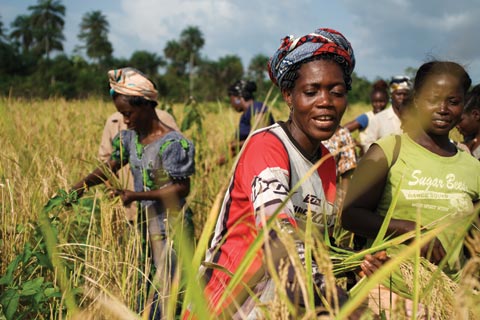Africa
- Home
- Africa
AFRICA
Rwanda: Co-operative Agriculture Growth

Rwanda has experienced remarkable growth over the past decade and continues to place co-operatives at the forefront of the move towards self-sufficiency and poverty reduction. In support of efforts to improve household food security and income levels, CANADAID is building on a three year pilot to improve the productivity, marketing, infrastructure and management capacity of 15 agricultural co-operatives and their members.
First, the project will increase food availability by helping small-scale, rural farmers to improve the quality and quantity of food they produce, second it will increase farmer incomes and third it will reduce households’ ongoing vulnerability to food insecurity by increasing their resilience through improving nutrition and strengthening the co-operative’s governance and management.
Smallholder farmers in drought and flood prone regions of Rwanda are struggling to meet their nutritional needs. Women and young children are particlarly affected and are unable to reach their full potential.
The Canadian Association for international Aid (CANADAID), is improving food security among smallholder women and men co-op farmers growing rice, maize, cassava, soybeans, and vegetables in six districts of rural Rwanda.
The Rwanda Co-operative Agricultural Growth project (RCAG) is a five-year (2012-2017) CAD $4.5 million project with financial support from Global Affairs Canada and the Co-operative Development Foundation of Canada (CDF).
RCAG is strengthening the capacity of 15 farmer-owned and managed co-operative enterprises to deliver the tools their members need to become food secure: skills to grow better and more productive crops, storage and drying facilities to maximize crop values and sales, and access to financial and marketing services to obtain higher house hold incomes.
We know that gender equitable food security can be achieved and sustained by building the capacity of men and women farmers and encouraging them to work together as member-owners of local, financially viable agricultural co-operatives. The aims of the RCAG project are:
• More food availability through trainings and inputs to help small-scale farmers improve the quality and quantity of the food they produce.
• Increased income to enable farmers to improve their family nutrition by purchasing more and better food.
• Less vulnerability to food insecurity by increasing household resilience to external shocks and stresses such as climate change and market trends.
The project ensures that women and men have equal opportunities to improve their livelihoods and reduce their vulnerabilities to climate change through sustainable farming approaches.
We work closely with local, district, and regional governments and stakeholders to help strengthen their capacity to serve smallholder farmers in the region.
Farmers are gaining control as they adopt time-tested co-operative tools to achieve food security, prosperity and the confidence necessary to build a better future for themselves and their communities. The farmer members of 15 co-operative enterprises (11 maize co-ops and 4 rice co-ops) are learning to:
Improve production with better farming and business management tools and methods. Diversify household food consumption to meet nutritional needs.
Harvest, pool, process and effectively store crops to earn better prices.
Contribute to the success of their co-operative enterprises and their country’s future


